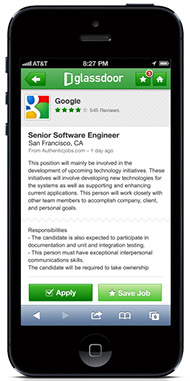How to Hire a Programmer (24 Actionable Tips for Non-Techies)

I think we can all agree:
Hiring a programmer can be an extremely daunting task.
Especially if you can’t program.
How do you know what to do? What questions to ask? What steps to take to hire a software engineer that fits your business?
I know:
It’s overwhelming.
But it doesn’t have to be:
With our list of actionable tips, technical hiring will no longer be a headache and…
…you can double your chances of securing that dream software developer.
In today’s post, I will show you 24 of the best tips that’ll help you hire great programmers for years to come.
1. Write A Job Post That Sells
“Salesmanship is limitless. Our very living is selling. We are all salespeople.” – James Cash Penney
Writing an effective job description is essential if you want to attract a programmer to your company.
Crafting sentences that sells your business can be hard:
But it need not be.
You just need to keep one simple key idea in mind:
You’re selling!
You’re selling your business and its benefits to the computer programmers.
From the duties they will perform, the wage they will get, bonuses, the ‘values’ of your company. Every aspect of the job description needs to be written to sell.

Remember:
Don’t just talk features: talk benefits.
For example:
You offer training – That’s a feature.
With world class training that runs seamlessly alongside your job, you will take your skills to new heights… and your wage along with it. – That’s a benefit.
Remember that benefits are outcomes. In the above example, the outcome is better skills and increased wages.
Here’s How you do it:
- Get a pen and some paper.
- Write a description of your business.
- Write the problems you need solving, the skills, and personalities you would like the candidate to have.
- Draw a line from each point and write the BENEFIT of each feature – The benefit is the outcome of the feature.
- Write these benefits into your job post description.
Be sure that every bit of information sells the position you are looking to fill.
Don't Miss Out on Talent! - Lean How to Write a Job Post That SellsClick To Tweet2. Contact Passive Candidates
“70% of workers consider themselves passive job seekers” – GCS Recruitment
As discussed in the website Recruitment International, a massive 70% of job seekers are passive.
But what does that mean?
It means that only 30% of all people seeking a new job are actively hunting for one.

Passive job seekers aren’t actively looking for a new job, but would be open to changing jobs that pay more, challenge them, and further their career.
But why are so many seekers passive?
Here’s 4 reasons:
- Job sites only show about 30% of people actively looking for jobs, never mind the massive 70% of total job seekers who aren’t looking at all.
- Intelligent job hunters know the best jobs are yet to be posted or never get posted on the traditional job networks.
- Many people would like to earn more or further their career but are relatively happy with the job they have and would only move if the opportunity arose.
- Many Job seekers stay away from job sites because of competition.
Make it your goal to target passive candidates by following this rule:
Be active, take the initiative, seek them out, and ask them to join you.
Don't Miss Out on 75% of the Talent Pool! Contact Passive Candidates! Click To Tweet3. Ask Questions Beyond Coding
“Don’t ever be afraid to ask any question.” – Richard Eyre
There is a lot more to programming jobs than than just programming.
When interviewing, be sure to ask a broad range of questions to find out how the person sitting before you will fit into your company setup.
Here is an example of some features that would be good to know:

- Are they a leader?
- Are they introverted or extroverted?
- Are they naturally positive thinkers?
- Do they go above and beyond what is expected?
- Do they have a history of achievement?
- Are they competitive?
These are all attributes that will broaden your understanding of the prospect and will help make better and deeper recruitment decisions.
There are hundreds of possible questions you could ask.
Here are some of the best to get you started:
- What results/achievements have you achieved? – Discover what end product they have created. How many games have they’ve personally been part of that have been deemed successful.
Remember, a world class software engineer could be part of a poor team so don’t rely heavily on this. - Tell me about a time when you failed to deliver something? – It’s not about avoiding failure, it’s about how you deal with it when failure inevitably happens.
- What do you like about your current job and what don’t you like? – Open ended question that can tell a useful story about the candidate.
- Tell me a time when you’ve helped a non-programmer with a tricky programming task? – This question can show leadership skills and the willingness of an individual to coach or mentor.
Here’s a great resource to help discover the best .NET developer for you’re project.
Get a Deeper Understand of the Prospect. Ask Questions Beyond Coding!Click To Tweet4. Use Testing Tools
“Making good decisions is a crucial skill at every level.” – Peter Drucker
When you have no programming skills to call on, hiring a developer can seem like a daunting, scaling a vertical cliff, task.
There are so many variables, so many details to worry over, the non-techie can get overwhelmed.

The Result:
Bad, costly decisions.
But what if I told you there was a better way?
We at Tests4geeks have worked tirelessly to give you that better way.
But what do we actually do?
The answer – programming tests.
How could it help you?
Would you like to know that every candidate waiting for an interview in your office has already been screened and possess the technical skills needed for the job?
Well, this is exactly what we can do for you. We give you an easy to use online tool which filters your recruitment process.
By using our tests, you will filter out unskilled candidates so you don’t waste time when interviewing.
Ask yourself…
… Would you invite a guy to an interview for a driving position if this guy did not even have a drivers license?
The same applies to IT professionals. Why invite a candidate to interview if they lack the main requirement – programming?
How does this tool work?
That’s simple…
You fill in the candidate’s name and email, get the unique test link, then send it directly to the candidate (via email or Skype).
The candidate then takes the test by clicking the link you gave them, and that’s it!
After the candidate finishes a test, you get the report sent to your email automatically!
You save time, money, and you know the candidate can do the job you need them to do.
So say NO bad hiring decisions that could cost you time, money, and potentially, your business.
Don't Get Caught Out! Use Testing Tools to Filter Out Unskilled Candidates.Click To Tweet5. Look for Openness to Learning/Coaching
“Recently, I was asked if I was going to fire an employee who made a mistake that cost the company $600,000.
No, I replied, I just spent $600,000 training him.
Why would I want somebody else to hire his experience?”
– Thomas John Watson Sr., IBM
Coaching and learning are vital to all Human activities.

Think about it for a second:
Is there anything you do where learning hasn’t been essential either in the past or as an ongoing feature?
Something as mundane as watching TV took years to master.
Skills needed include:
- Understanding language.
- Learning to interpret what your eyes are seeing.
- Emotional intelligence.
These skills are needed just to sit down to watch the latest episode of Game of Thrones!
Therefore, it’s essential to hire software engineers that can both teach and be taught.
A great way to test this is to extend the white board test.
Do two things:
- Give feedback on their white-board work – see how they react to this. You want them to be open to constructive criticism, and have a desire to learn from those around them.
- Let them explain how to do something – Being able to coach somebody shows several desirable traits. Not least of all Leadership. It’s important the technical people in your business can explain things to non-technical people in easy to understand fashion.
The ability to teach another coder, say a student, helps pass useful skills on to other employees.
Look for life Long Learners, and Leaders That Help to Coach!Click To Tweet6. Build Relationships With Universities
“Everyone talks about building a relationship with your customer. I think you build one with your employees first.” – Angela Ahrendts

A great way to grab up-and-coming talent is to build relationships with local and foreign university’s and colleges.
This is how you do it:
- Go to universities. – Introduce yourself and get to know receptionists/gate keepers.
- Introduce your business to the right people – Tell these people you are looking for quality graduates to hire.
- Introduce yourself to different classes.
- Tell the students who you are, what you are trying to do, and what your business does.
- Create a project that’s pertinent to what you do.
For example:
If you make computer games, set them a project of designing one game mechanic. - Incentivise action – Offer the top 3 best entries the chance to internship with you for 6 weeks.
- Once you have your top 3 winners, take them in and nurture them. Let them work on your project for the 6 week period.
- After the 6 week period, keep the students who are skilled and let the others go.
This project is great for determining students mind sets. Students who “can’t be bothered” to take part are weeded out of the recruitment process automatically.
By the end of the process, you could have some of the best up-and-coming talent in the country working for you.
Hire Potential! Build Relationships With Universities! Click To Tweet7. Create A White Board Test
The idea behind the white board test is simple:
Get the candidate to solve programming problems on a whiteboard in front of you, in real time.

But why do this?
There are many things the white board test can tell you about a candidate including:
- Their standards.
Do they cut corners or do they solve problems by the book? - How they solve problems?
Do they approach problems in a logical systematic way or do they take a more ‘gut feeling’ random approach? - Do they rush or are they slow and thoughtful?
- Do they comment on their coding?
If they comment on white board, it shows they communicate well through their code. - Ability to work under pressure.
Looking over a programmers shoulder as they work. This places a great deal of pressure on them. - It shows they can solve the problems that a non programmer couldn’t.
It’s a good way to test rudimentary programming skills. - Communication skills.
Do they walk you through what they are doing?
How to set up the white board test:
- Get a white board with a stand, multi-coloured markers to write on it, and a cloth for whipping away mistakes and cleaning the board in-between interview sessions.
- Go on the Internet, Google is a good place to start, and find simple problems that need solving in the programming language of your choice.
IE: C++, C#, Java, and other popular languages.
You can also read our own articles “Programming Interview Questions to Ask” for Java and C++. - Find the solutions to go along with the questions. Some solutions may have multiple answers so be sure to cover as many eventualities as possible.
- Photo copy multiple sheets of the answers so you can use one sheet to take notes for each candidate.
- Before the candidate arrives, write the problems on the white board leaving plenty of room for answers and other workings.
- Invite them in, and after spending a little time building rapport, ask them to solve the problems.
- Let them work through the problems. See what they do. Write your observations on the answer sheet.
- When they finish, ask them to explain their reasoning. Write your observations on the answering sheet.
- Once the interview is over, file the answer sheet you just used, clear their workings out on the board, get a new answer sheet ready. Then get ready for the next candidate.
Note: Some programmers do not work well under the pressure of somebody watching them work. Even world class developers can buckle under pressure so don’t use this method independently of others.
Always Test Your Candidates: Use the White Board Test!Click To Tweet8. Seek Out The Self-Educated
“Running taught me valuable lessons.
In cross-country competition, training counted more than intrinsic ability, and I could compensate for a lack of natural aptitude with diligence and discipline.
I applied this in everything I did.”
– Nelson Mandela
Don’t rely on College degrees and formal education as your guide.
You will miss out on some of the best candidates if you do.
Be open-minded to self-taught talent:
These are software developers and freelance programmers who’ve taught themselves using books, online tutorials, and videos.
You might think a formal education is better.
But you would be wrong.

Self-education provides a plethora of advantages that include:
- The ability to create your own curriculum. Learn what you need when you need it.
- Multiple ways of learning to fix the same problem in creative ways.
- Higher speed of learning.
- Books, online tutorials, and videos are more up to date.
- Learning for yourself takes great dedication and great character.
- Grows an ability to absorb new information.
- Can lead to a more well-rounded education.
- No wasting time writing pointless dissertations and essays.
- You learn by doing.
- Ability to act on your learning sooner by putting it into practice by freelancing.
And there are many more advantages:
So much so, I could write a book on the advantages of self-education.
So remember:
The self-educated are some of the best developers you can find. Snap them up while you can.
No Degree Required: Seek Out The Self-Educated programmers!Click To Tweet9. Set Up A Tester Job
“Testing leads to failure, and failure leads to understanding.” – Burt Rutan
There is no better way to determine a programmer’s ability than a test.

Here are just a few ideas to get you started:
- Ask them to prototype something for you.
It will test their skills to the maximum as they have to produce results quickly and something that works. - Invite them to work on your main project for a week.
This will let you observe how good they are at coding and how they deal with new surroundings, new people and a change in culture. Just be sure to pay them. - Watch actual coding work.
Get them in front of a machine and get them to do simple tasks for you. Remember, unless you know how to code yourself, you should find tests, with answers, on the Internet or in books. - Get a group of candidates to work together.
This is a great way to discover programmers that can set aside their differences to work together under pressure.
10. Their Career Is Their Hobby
“I don’t have time for hobbies. At the end of the day, I treat my job as a hobby. It’s something I love doing.” – David Beckham
Nothing demonstrates passion for one’s job more than turning it into a hobby away from work.
If you want to hire software developers with passion:
- Find coders who tinker and play with their skills in their spare time.
- Find a game programmer that experiments with small games on Android devices.
- Find coders that love nothing more than to tinker with their Raspberry Pi on a Sunday morning.
These are the software engineers that live and breath their craft.
How do you determine a candidate’s hobbies?

Simple:
You do your research.
- Look them up on Facebook or Google. Type their name in and write down what groups they are part of. What events have they attended.
- Look on their CV. Do they list any hobbies?
- Ask their earlier employer. Their old boss may not be able to tell you but old work mates might: Speak to some of the people the candidate directly worked with. They may be able to help.
- Ask them in the interview. It’s a good thing to ask them straight up in the interview as it will also help you build rapport.
11. Show Your Passion
“You can have the best strategy and the best building in the world, but if you don’t have the hearts and minds of the people who work with you, none of it comes to life.” – Renee West, Luxor and Excalibur Hotel
Be passionate.
If you’re not passionate about your business:
Drop what your doing and stop.
Passion drives the greatest minds, the greatest entrepreneurs forward.
If you are not passionate about what you do, then you need to drop everything, and find your passion. Only then can you hope to succeed.
If you already have that passion, then it’s time to spread it over the world.

You need to make that passion shine out like the morning sun.
It needs to flow over everybody and bathe them in positivity.
Candidates who meet you, need to feel your passion for the business.
Why?
Passion is the most contagious thing known to man.
People can’t help but get carried away with it.
Watch any football match:
When a quarterback runs over to the crowd, throws his arms in the air drumming up the support of the crowd, in their thousands, the crowd can’t help but have a sudden spurt of passion.
You want a candidate to be tingling with excitement at the possibilities after they have talked to you. You want them to be desperate to get the job just so they can get swept away by your wave of enthusiasm.
But, how do you show passion?
Well here are a few pointers:
- Talk with enthusiasm – be enthusiastic about your business in all ways possible.
- Be positive in all things, in business and in life.
- Re-frame any negatives into positives.
- Always talk to people about the huge benefits of your business.
- Tell the programmer how their work, and your business, is going to make the world better. How it will change your industry for the better.
- Show your passion through body language – be animated, gesticulate wildly, lose yourself in the moment.
12. Look For Passion In Candidates
“Do not hire a man who does your work for money, but him who does it for the love of it.” – Henry David Thoreau, Life without Principle
Just as passion is important for your business, It’s also important for computer programmers.
You want them to have a passion for their craft.
A passion for the industry that your business is in.
Passion is so powerful:
It pushes people through hard times and helps get you through those inevitable all-nighters.
It creates an urgent unstoppable need to be the best, to achieve the unachievable, to conquer the un-conquerable. It’s what unites the greatest men and women.
They had a passion for what they did and do.

Remember this:
Passion drives success.
So be passionate and look for it in employees.
But for some, passion can be difficult to spot.
Here are some pointers for picking out passionate software developers when recruiting:
- Do they love what they do? Do they get exited by talking about their prospects in programming?
- Do their eyes light up when they are talking?
- Does their body language seem over the top? Are they gesticulating wildly?
- Do they talk fast. Almost to the point of getting out of breath because they have so much to say?
- Do they talk about achievement and wanting to be the best?
13. Don’t Rush Into Hiring
“Time spent on hiring is time well spent.” – Robert Half

Don’t rush into hiring.
Only one thing will happen if you do:
You will make mistakes.
Don’t let that be you.
Take your time…
Collect Data.
Even if it means missing out on a great coder:
There are always more fish in the programming sea.
Don't Rush Into Hiring! Time Spent Hiring is Time Well Spent - Robert HalfClick To Tweet14. Check The Market Price

When looking to hire a programmer, it’s vital you perform research to determine the market price for the skills and experience needed.
There is no point starting the hiring process, thinking you can pay somebody $20 an hour when the going rate is $40.
Likewise, you don’t want to bleed cash by paying $40 an hour for job that commands a wage half that.
The answer, as with all things:
Do. Your. Research! Be greedy when collecting data.
Get to know the current going wage for software developers, by assessing your industry and geographical area.
You can do this easily:
- Check on traditional job websites such as Reed.co.uk in the United Kingdom or Indeed.com in the USA.
- Search for similar jobs to what you are hire and make a note of the salaries being offered.
- Check out best sites to hire freelancers such as Upwork, Freelancer.com or People-per-Hour (or even Reddit).
- Search for freelance software developers and write down their hourly rates.
Don’t forget to filter our by region. E.g. programmer in NY cannot compete with freelancer in India in terms of rates (and visa versa in terms of quality). - Combine the 2 lists to find an average wage per hour for programmers with the skills and experience you need.
15. Don’t Underpay
“In this world, you get what you pay for.” – Kurt Vonnegut Jr., Cat’s Cradle
Everybody likes a bargain, I know I do, but when it comes to talent in the business world, we get what we pay for.
If you want top talent you need to pay top dollar for them.
But the price of hiring a Cheap developer can be even higher.

If you have to untangle their sloppy code and rewrite it, at best you could be spending 3 to 4 times your initial cost to put it right, or at worst:
You could lose your business.
So set aside as much money as your project budget will allow for recruiting talent.
Accept that if you want to create that world class app or game, you’ll need to pay for a world class developer.
Yes, you may stumble on a great student who is just starting out, but don’t bet on it.
However, that doesn’t mean you should overpay for talent either.
Only hire programmers that meet the minimum Viable skills you need to get the job done to the standards you want.
There is no point in paying out huge sums of money for a computer programmer who can code in 12 programming languages if all you need is somebody to code is C#.
After all, there’s no point hiring Superman if Aquaman can do the job!
Be smart:
Don’t underpay for skills you need, but don’t overpay for skills you don’t.
Don't Underpay for Developers - You Get What You Pay for!Click To Tweet16. Be Mobile Friendly
As of 2017, 86% of candidates perform job searches on smartphones first.

86%!
Do you want the best talent?
Of course you do!
Then make sure all your job listings are on websites that are mobile friendly.
Otherwise, you’ll be missing out a huge selection of potential programmers.
Three simple ways to make sure you’re mobile ready are:
- Use WordPress for your website – WordPress makes all themes mobile friendly by default.
- Get your job on major job posting sites – They are all mobile ready and are great for smartphone users.
- Get on smartphone apps – There’re many dedicated job hunting apps such as SnagAjob on iTunes and Simply Hired on the Google Play store, so be sure to hunt them down and get your job on them.
17. Identify Problems And Skills
“A winner is someone who recognizes his God-given talents, works his tail off to develop them into skills, and uses these skills to carry out his goals.” – Larry Bird
One of the most important tasks you need to do when recruiting is determining the problems you need solving and matching skills to those problems.
Let’s take a look at a simple step by step process:

- Tell yourself – “I need a computer programmer!”
- Then get a pen, a piece of paper or a note book, and find a comfy chair.
- Note down the technical issues that you and your team can’t solve.
For example:- You may need a new gameplay mechanic.
- A new menu system in your app.
- Interactivity on your website.
This creative thinking of your problems will help you focus on your needs.
It will also help you create questions based around your problems for future interviews. - Ask your staff for advice.
If you’re a game developer, you may have a designer that needs a particular feature added. Ask them and write their ideas down.
Now it’s time to match skills to problems:
- Grab the list of problems you need fixing and look over it.
- Look at each of your problems and break them down:
What programming language does the problem use? What type of software is being made? What type of software is being used? Is it app development? PC Development? Web development? What specific areas of each?
If your developing games, what part of a game? - Type each of the jobs in to Google to learn more about them. What skills repeatedly crop up in the search results?
- Check out job listings on job sites that describe similar job roles as the one you are offering. Look for the skills they are asking for.
For example, a computer game company may ask for skills in C++ and and some other soft skills such as communication. - Write down the list of skills you have identified next to each problem.
You’re now starting to build a picture of what skill your programming candidates will need in order to help complete your project.
Identify Your Businesses Needs Before Starting the Hiring Process!Click To Tweet18. Identify Personality Traits
“It’s more than just selling pizzas. It’s being a good fit for the community. We hire based on the betterment of the community as much as anything.” – Mark Starr, David’s Pizza.
The last step in creating your ideal Programmer persona is to look for key personality traits that would let them slot into your business’s culture.
Nobody wants a troublemaker that makes teams efforts stutter to a halt.
Your looking for somebody who is going to work well with your team.

And it couldn’t be easier:
- Get the pen and paper out ready to take notes.
- Write down emotions or ideals you have about the culture of your business.
For example: You may have an easygoing environment. Perhaps team work and a little of fun is important. - Ask your staff what they think the environment is like, what personality traits would best fit in.
- Look at your list and underline the suggestions that show up the most or seem most important to you.
Now you’ve developed a complete programmer persona.
You know:
- What problems needs solving.
- What skills are needed to solve them.
- What personality traits are important to fit into the business culture.
19. No Such Thing As Perfect
“Have no fear of perfection – you’ll never reach it.” – Salvador Dali

Don’t wait around for the perfect candidate:
They don’t exist.
If you try to wait for the perfect programmer, you will wait a long time.
You’ll never hire anybody.
There is no perfect candidate.
One might appear perfect at first but little niggles in personality or method will always bubble to the surface.
Perhaps they are half an hour late every morning.
Maybe they have a unique way of solving problems that isn’t compatible with your business’s established methods.
Maybe they are shy around people which makes communication difficult.
There is an infinite number of problems.
It’s your job to find the best fit.
Not the perfect fit.
Remember:
People have issues, problems, difficult personalities. They are not robots.
Learn to get the best out of people’s weaknesses as well as their strengths.
Nobody is Perfect. Find The Best Fit, Not The Perfect Fit, for Your Business.Click To Tweet20. Walk Away

“Never sit at a table you can’t walk away from.” – Joss Whedon
A nice and simple one here.
Learn to walk away.
If a potential programmer is messing you around or your gut instinct is telling you something doesn’t feel right, then you should learn to say, “thank you for your time”, and walk away.
There’s always more programmers for hire.
Don’t get stuck with a dud software developer:
Walk away.
There's Always More Programmers For Hire. Learn To Walk Away. Click To Tweet21. Written Communication
“The art of writing is the art of discovering what you believe.” – Gustave Flaubert
Written communication can tell you how somebody thinks.

Are they creative or technical? Can they communicate clearly and succinctly?
All these features and many more can be determined just by looking through a programmers CV.
Dig deep into the structure of a CV.
Keep an eye out for:
- The layout of the CV – It can show creativity or logical thinking.
- Clear and logical Sentence structure – Shows the person can formulate ideas clearly in their head.
- Easy to understand writing – A good written communicator is usually a good communicator in person.
- Grammar and spelling – Paying attention to grammar can show a willingness to go above and beyond.
- Use of overly long words – This can indicate ego, which can sometimes, not always, be a problem.
So remember:
Pay attention to a programmer’s writing. You never know what information you can extract from it.
Good Written Communication Is A Sign Of Creativity And/Or Logical ThinkingClick To Tweet22. Check For Cultural Fit
“Previous experience, key skills, and education. They’re undoubtedly all important.
But, what’s another major determining factor of whether or not that hopeful interviewee deserves an offer?
Cultural fit.”
– Kathryn Minshew
Cultural fit has to be the most important yet overlooked step in the recruitment process.
But first:
What do I mean by cultural Fit?
Cultural fit means how compatible an individual is with a group’s values and beliefs.
For example:
If you moved to Spain to set up a business, the cultural belief is to take a nap in the afternoon when the sun is hottest.
If you originated from a fast moving culture, you may find this cultural difference difficult or impossible to adapt too.
So you may be better suited to working in a faster pace culture such as London, England.
Business is no different.
Some of the values and beliefs that can set your business apart can include:

- Working in teams.
- Not working in teams.
- Openness to discussion.
- Need for silence.
- Serious environment.
- Belief in the business’s core values and mission.
- Questioning the status quo.
- Lack of managers.
- Constant education.
- Fun environment.
There’s limitless numbers and combinations of values and beliefs that can make up your business’ culture.
If you hire somebody that is not compatible, you will run into problems.
Culture is more important than skills, or education.
But how do you find out if somebody is the right cultural fit?
Here are a number of Ideas to get you started:
- Ask broader questions of the candidate – Take care as they may just tell you what you want to hear.
- References from Managers – Ask ex-mangers or current employees what the business culture is and how the candidate adapted to that culture.
- Research previous employees – Do candidates previous jobs have a similar culture to your own business. Did their jobs before the last one have different cultures? This information may indicate a good fit or the ability to adapt.
- Ask The candidates Ex-work mates – Asking Candidates ex-work mates is a great way to find out how the candidate fitted in from people they closely interacted with day after day.
23. You Only Borrow Great Developers
“Great vision without great people is irrelevant.” – Jim Collins, Good to Great
Remember, you only borrow developers.
If you hire the best, they will eventually leave either for bigger and better businesses, or to create their own company.
Regardless of the reason, the best always have ambitions for bigger and better.

So you must accept one thing:
Your Best developers will leave.
So make it your mission to constantly bring in fresh blood.
Great Employees Move on to Great Things: You Only Borrow Them!Click To Tweet24. Be A Great Employer
“I manage through a sense of humor. We all work hard, and work has to be a really interesting, fun place. And that has to start at the top.” – Carol Bartz
People want to work for great employees!
Look at a business like Google:
People from all over the world dream of working for them.
Working takes up a minimum of 8 hours of peoples lives 5 days a week.
Google understand we spend a lot of our adult life working so they want to make it fun.
They want you to love working for them more than you love being at home.

At their Campus, they have:
- Gyms
- Restaurants
- Football pitches
- Tennis courts
- Sleeping pods
- Arcades
- Indoors sports
- Chill-out areas
They also make the mundane every-day activities like walking down stairs exiting by installing Slides!
They do everything to make the work environment feel like an adult play ground.
It’s your job to make your business as desirable a place to work for as possible.
Get a reputation of being a fun place to be. Where employees both work hard and play hard.
Now I know you probably don’t have the money to turn your office into a Google-like geeks playground paradise.
But that doesn’t mean you can’t start moving in the right direction.

Here are a number of Great Ideas to get you started.
- Install a Quiet room for meditation and contemplation.
- Create a library full of on and off topic books.
- Have a chill out area with Sofas, Tvs, game consoles, and coffee machines.
- Buy a small Pool table.
- Get a Dart board.
- Get some cheap exercise machines.
These ideas will set you on the road to being a great place to work.
Attract the Best Talent? Be A Great Employer! Click To TweetWhat Do You Think?
Now that you’ve read through the 24 programmer hiring tips, it’s your turn!
What was your favorite tip?
Do you have any tips to share?
Please leave a comment below, right now, to let me know.
Coding skills assessment
If you're looking to hire software engineers and want to ensure that you only interview qualified candidates, we've created coding tests that can significantly simplify your hiring process:
Pingback: OOP and C# Tricky Interview Question • Dot Net For All
Pingback: asiatic sourcing
Pingback: how to build your own building
My brother needs to hire a programmer for his business so I appreciate the tips in this article. You make a great point that my brother should look for a programmer who is passionate about his work and enjoys what he does. This way he can find a programmer who wants to innovate and find the best ways to improve my brother’s business through technology and coding.